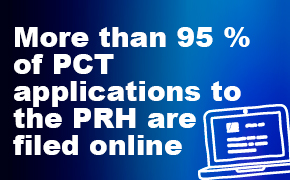International (PCT) patent applications
There is no PCT patent, but the international Patent Cooperation Treaty (PCT) is a system for facilitating the application procedure. You file a PCT application with a Receiving Office (RO), and it is processed by an International Searching Authority (ISA). After the international application phase, you can apply for a patent at a national or regional patent office. Thus, the outcome is not an international or a global patent, but a number of national patents.
The system is based on the Patent Cooperation Treaty (PCT), which came into force in 1978, and it is administered by the World Intellectual Property Organisation (WIPO), a United Nations agency, with its headquarters in Geneva. In 2023, the number of PCT-contracting countries was 157.
Benefits
The PCT system offers many benefits for patent applicants:
- You can start an international patent procedure by filing one single application, which gives you the option of a patent in all the contracting states, which means, in more than a hundred countries.
- When you choose the PRH as the Receiving Office (RO), you can file your application in Finnish, Swedish, or English. Please note that the form has to be filled out in English. An application in Finnish or in Swedish has to be translated into English later on. The deadline for a translation depends on which office you choose as the Searching Authority (SA).
- You can submit your application to us up to the last day of your priority year. When the priority year is expiring, people are often in a hurry to decide whether or not to apply for a patent outside Finland. If you do not know exactly in which countries to file, it is a good idea to use the PCT system, as you will have 30 months from the filing date of your first application for consideration. At this point, you will probably be aware of how to make use of your invention commercially, and in which countries you want to get patent protection for it.
- You can postpone large costs until later. Proceeding to the national phase means increased costs, as the application must be translated into the official languages of the national authorities. Furthermore, you will have to pay the official filing fees and the fees to your representatives in the countries concerned.
- You will get an international search report and a written opinion, and if you want, an international preliminary report on patentability. Later on, these documents will be available to national patent authorities. At the national phase, it may be possible to expedite the procedure if you take advantage of our Patent Prosecution Highway (PPH) agreements.
- Your financial risk will be lower, because you will get the international search report and, if you want, an opinion on patentability before you have to decide in which countries you finally apply for a patent.
How to file a PCT application

Other offices where you can file a PCT application are the International Bureau of WIPO (IB) and the European Patent Office (EPO). The Swedish Patent Office (PRV) and the EPO also work as ISAs, and you can choose either of them instead of the PRH.
Read more about how to file a PCT application with the PRH.
Two-stage processing and national phase
The PCT search includes two stages. The first is a novelty search. It is carried out by an International Searching Authority (ISA), and results in an International Search Report (ISR) about 3 months after the ISA received your application, or in 9 months from the priority date, depending on which term expires later. The search report includes a list of cited documents and a written opinion (WOISA) on the novelty, inventive step and industrial applicability of the invention.
The second stage is optional, and you have to request it, either within 3 months from the date given on the search report (ISR), or within 22 months at the latest from your first application (the earliest priority), depending on which term expires later. At this stage, the International Preliminary Examining Authority (IPEA) performs a preliminary examination of patentability, which results in an International Preliminary Report on Patentability (IPRP). The PRH also acts as an International Preliminary Examining Authority (IPEA).
As the outcome is not an international patent, you must enter a national or regional phase after the international stages. Even though the PRH has been the ISA or the IPEA, you must proceed to the national phase at the PRH if you want your PCT application to result in a Finnish patent. Almost all the contracting countries apply a deadline of 30 months at least from the earliest priority to the entry into the national phase, whether you had made a demand for preliminary examination or not.
Read more about entering the national phase at the PRH. Information about entering the national phase in other countries is available on the WIPO websiteOpen link in a new tab.
Do I need a representative (patent attorney or agent)?
We recommend that you appoint a representative (a patent attorney or agent), although it is not compulsory. Finnish applicants can attend to the international phase themselves. In most countries, however, you must have a local representative for the national phase. The PCT procedure includes a number of deadlines, and missing them may be fatal for your application. An expert in the field can save you a lot of trouble. Read more about representatives.
Further information
There is detailed information about the PCT system on the WIPO website. For example:
- The PCT Applicant´s GuideOpen link in a new tab
- Time limits for entering national/regional phaseOpen link in a new tab
- The PCT contracting statesOpen link in a new tab
Information about filing and processing under the PCT is available in Finnish in the PRH manual “Patenttikäsikirja" (see chapters K and L). Patenttikäsikirja (pdf, 2.4 MB)
Read more about the fast-track processing of applications (Patent Prosecution Highway, PPH).
